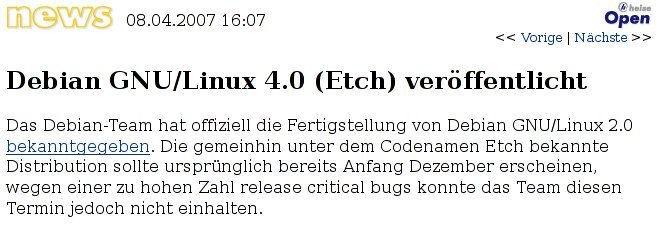April 2007 Archives
2007, April 04 (Wed) | |
Linux – On C++ ABIs Or Debian, SCIM Input Method and a crashing Firefox | |
|---|---|
If you want to use the SCIM Input Method Editor on Debian (Etch) together with the official Firefox, you will ineviably be presented with: Apparently the problem is caused by firefox being linked against libstdc++.so.5 while scim is linked against libstdc++.so.6. So what happens is that when Firefox tries to load the scim GTK_IM_MODULE, the libstdc++.so.6 is loaded into Firefox, and this won’t work because the ABI changed between version 5 and 6 of libstdc++. This leaves us with three possible solutions:
Bonus: To use SCIM with Opera, keep in mind that Opera is a Qt (“KDE”) application. You can either use the XIM method described above and set |
|
2007, April 08 (Sun) | |
Linux – Juhuu, es ist ein Etch | |
Etch wurde so eben veröffentlicht und die Leute vom heise Newsticker arbeiten wohl auch an Ostern, wenn auch verwirrt: (heise online: Debian GNU/Linux 4.0 (Etch) veröffentlicht) Die neue Distribution läuft nach Aussagen des Entwickler-Teams auf nahezu jedem Computer vom Handheld bis zum Supercomputer, weitere Informationen dazu enthält die Mitteilung zur Veröffentlichung. |
|
2007, April 20 (Fri) | |
Linux – Booting floppy images using GRUB | |
Booting floppy images without having a real floppy drive can be handy for example when updating the BIOS or maybe even installing operation systems. First get memdisk which is part of syslinux (also in the debian-package syslinux: dpkg -L syslinux|grep memdisk). memdisk is a small driver which emulates a disk in the RAM. Then configure GRUB to take memdisk as kernel and the floppy image as initrd. memdisk and the floppy images need to be accessed by grub, so put them in /boot. A sample GRUB configuration is:
|
|
2007, April 30 (Mon) | |
Linux, Netzwelt – Evolution & SyncML | |
For a long time, I've been trying to synchronize contacts and calendar entries between my mobile phone and evolution. Now I finally found a solution that really works. There is a project called SyncEvolution. You will find the sources at http://www.estamos.de/projects/SyncML/index.html libecal1.2-dev Then you can compile and install it with the usual `./configure; make; make install` The configuration is a bit weird: basically you will have to create these files in your home directory: The last 4 files are optional, depending on which items you want to synchronize. <server> is the identifier, just in case you have more than one SyncML-server. syncml/config.txt contains the server configuration. You can use etc/syncml-config.txt in the source directory as a template. The configuration templates are well-commented, so I didn't need any further documentation. I sometimes have problems, when syncing calendar entries that last a few days and are marked as 'all day'-events. Just enter a start and end time and it will work fine. |
|
Navigation | ||||||||||
|---|---|---|---|---|---|---|---|---|---|---|
| « | (older) | (newer) | » | |||||||
| « | March 2007 | « | Main | ‹ | All articles list (Archives) | › | Search | » | May 2007 | » |
